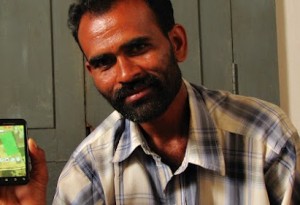 On the road to Chennakeshavapura, a helpful sign on a stone identifies the village as CK Pura for short, but that message is lost on many illiterate residents. For them, reading and writing matters less than channeling enough water to their fields and growing enough peanuts to ride out the drought years.
On the road to Chennakeshavapura, a helpful sign on a stone identifies the village as CK Pura for short, but that message is lost on many illiterate residents. For them, reading and writing matters less than channeling enough water to their fields and growing enough peanuts to ride out the drought years.
In 2007, Swiss computer scientists and Indian agricultural scientists offered to install wireless sensors in the peanut fields at CK Pura and collect data the farmers might find useful for improving their yields. There was just one problem: few of the farmers could read the recommendations. Continue reading Designing a Smart-Phone Alphabet for the Illiterate

